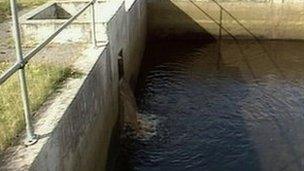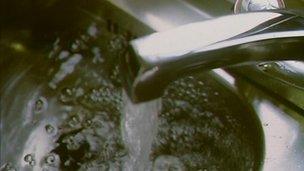Camelford water poisoning: Long-term health effects 'unlikely'
- Published

The aluminium sulphate was tipped in the wrong tank by a relief delivery driver at the unmanned plant
A water poisoning incident in Cornwall is "unlikely" to have caused long-term health effects, a report has said.
Camelford's water supply was poisoned in July 1988 when aluminium sulphate was tipped into the wrong tank at the Lowermoor treatment works.
Last year a coroner said it may have contributed to the death of a local woman Carole Cross.
The town's former Liberal Democrat MP said the report was a "bitter disappointment".
The report said exposure to the chemicals was unlikely to cause "delayed or persistent harm".
It has been published by the Lowermoor subgroup of the Committee on Toxicity, external of Chemicals in Food, Consumer Products and the Environment (COT) and claims to be the most comprehensive of its type.
The committee, which advises the chief medical officer at the Department of Health, also concluded that exposure to the chemicals was "unlikely" to cause future ill health.
Twenty tonnes of aluminium sulphate - used to treat cloudy water - was mistakenly tipped into the wrong tank at the unmanned plant by a relief delivery driver and the chemical went straight into the town's mains supply.
At the time of the incident, the then South West Water Authority insisted the water was safe to drink and suggested the "foul" taste of the water could be disguised by mixing it with orange juice.

Residents were told orange juice could disguise the "foul" taste of the tap water
'Bitter disappointment'
But people quickly began reporting a range of health issues, including stomach cramps, rashes, diarrhoea, mouth ulcers and aching joints and some residents said their hair turned green from copper residues.
The only person to lose his job after the poisoning was John Lewis, a water authority manager.
Carole Cross, who died in 2004 at the age of 59, was living in the area with her environmental scientist husband, Dr Doug Cross, when the water was poisoned.
A post-mortem examination found abnormally high levels of aluminium in her brain.
Last year West Somerset Coroner Michael Rose said there was a very real possibility the water poisoning contributed to her death, but "only a slight possibility" it caused her death.
Mr Rose is shortly to resume an inquest into the death of Richard Gibbons, who also claimed to have been affected by the water poisoning.
Mr Gibbons, who lived at nearby Tintagel, died in May 2010, aged 60.
The coroner told BBC News he could not comment on the COT report, while Mr Gibbons' son-in-law Phil Reed, said he would need time to "properly digest" the report before the family could respond.
Dr Cross, who resigned from the Lowermoor subgroup at the end of last year, described the report as "useless".
"I walked out in disgust because I could now allow my reputation as a scientist to be linked to this report," he said.
"It's useless. They haven't looked at medical records or carried out clinical evaluations on the people in Camelford.
'No conclusive link'
"The only good thing to come out of it is they've collected a lot of information from people as to how they felt at the time - but in scientific terms it's almost worthless."
Dr Cross said he is currently helping about seven families who have lost someone who was living in the affected area.
"There's plenty of research that already links aluminium to dementia - we don't particularly need more research... what we need is action," he added.
Lord Tyler, Liberal Democrat MP for North Cornwall from 1992 to 2005, said: "After nearly 25 years, this is a bitter disappointment.
"Many local people will justifiably find it difficult to see how this group can conclude that exposure to the aluminium has caused no delayed or persistent harm, when the coroner's conclusions in the recent case of Mrs Cross were so different."
COT set up the Lowermoor subgroup in 2001 at the request of the government to advise on whether exposure to the aluminium sulphate had resulted in "delayed or persistent health effects" and whether additional research was necessary.
Its report found "no conclusive link" between the water poisoning incident and the chronic symptoms and diseases reported.
However, it said further research was needed in a number of areas, including the effect of contaminants on neurological health, the effects on the development of children born to women who were pregnant at the time of the incident and the effects on children who were less than a year old in 1988.
- Published14 March 2012
- Published6 March 2012
- Published9 November 2010
- Published3 November 2010
- Published2 November 2010
- Published1 November 2010
- Published1 November 2010